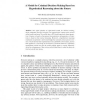Free Online Productivity Tools
i2Speak
i2Symbol
i2OCR
iTex2Img
iWeb2Print
iWeb2Shot
i2Type
iPdf2Split
iPdf2Merge
i2Bopomofo
i2Arabic
i2Style
i2Image
i2PDF
iLatex2Rtf
Sci2ools
103
Voted
IEAAIE
2009
Springer
2009
Springer
A Model for Criminal Decision Making Based on Hypothetical Reasoning about the Future
This paper presents an agent-based model for decision making, which integrates personal biological and psychological aspects with rational utility-based reasoning. The model takes a BDI-based approach, where generation of desires is based on the personal characteristics, and generation of intentions is based on the rational reasoning. Moreover, a hypothetical reasoning mechanism is exploited to derive knowledge that connects certain actions to desires. The model has been implemented in the LEADSTO environment, and has been applied in a case study in the domain of criminal behaviour. Simulation experiments pointed out that the model enables agents to reason effectively about the consequences of their actions, which helps them to make the decisions that best satisfy their desires.
Artificial Intelligence | Hypothetical Reasoning Mechanism | IEAAIE 2009 | Model | Rational Utility-based Reasoning |
Related Content
| Added | 26 May 2010 |
| Updated | 26 May 2010 |
| Type | Conference |
| Year | 2009 |
| Where | IEAAIE |
| Authors | Tibor Bosse, Charlotte Gerritsen |
Comments (0)

